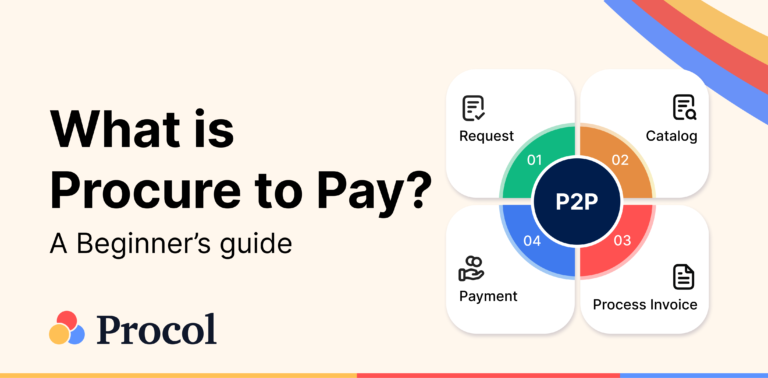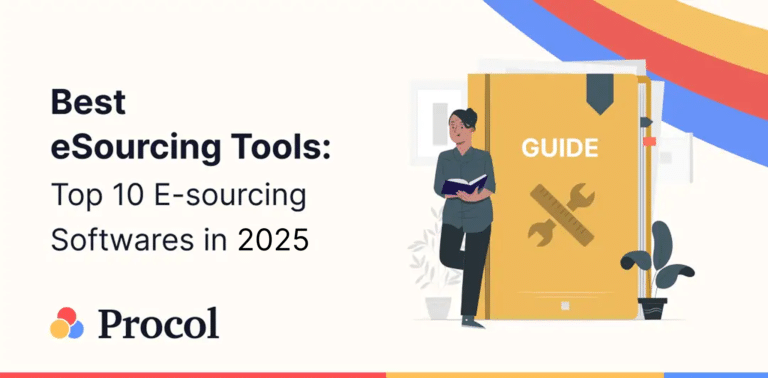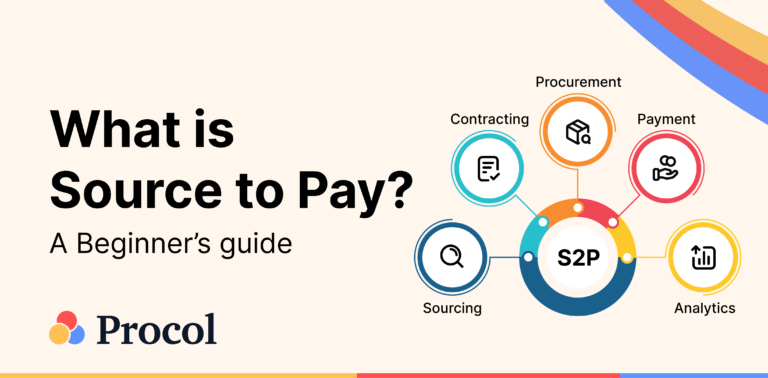Procol • April 15, 2025
Why Contract Management? An End-to-end Guide

In today’s complex business world, contract management is key to maintaining companies’ integrity and profitability. This crucial process doesn’t just handle making and carrying out agreements. It also ensures rules are followed, reduces risks, and finds ways to grow. You can’t underestimate how much good contract management matters in buying and selling. It protects against possible losses while boosting a company’s performance. In an era where every transaction counts, mastering contract management’s intricacies can significantly influence corporate strategies’ success or failure.
This guide offers valuable insights tailored for decision-makers aiming to navigate the complexities of contract coordination effectively.
What is Contract Management?
Contract management is the process of overseeing agreements from creation to completion. It involves handling contracts throughout their lifecycle, ensuring all parties meet their obligations. This process is crucial for maximizing performance and reducing risk in business dealings. It applies to agreements with companies, freelancers, and employees. Effective contract management is often characterized by the phrase “No Surprises.” Proper management ensures all parties understand their responsibilities, improving organizational readiness for audits and maintaining compliance. This transparency supports efficient business operations.
How does contract management work?
Contract management functions through a structured process that ensures all aspects of contracts are managed efficiently from start to finish. This process involves several key stages, each critical for managing contracts within an organization.
- Contract Preparation: Before managing contracts, you need to prepare them. This step involves defining the scope, terms, and goals of all types of contracts. Then, people with a stake in the contract work together to write a draft that meets legal needs and business aims.
- Contract Negotiation: After preparing the contract, it’s time to negotiate. In this stage, the parties discuss the contract terms, make changes, and agree on them. Negotiation is key because it lays the groundwork for what each party must do and their rights.
- Contract Approval: Once negotiations wrap up, the right people in the company need to approve the contract. This step ensures that all terms align with company rules and legal standards.
- Contract Execution: After approval, the parties sign the contract. This act binds them to the terms in the document.
- Contract Performance: Once the contract takes effect, the focus shifts to managing performance. This ensures all parties fulfill their obligations, and monitoring performance helps spot deviations from the contract terms.
- Contract Compliance: Regular checks ensure that everyone follows all parts of the contract, including the law and the specific terms set out in the agreement.
- Contract Renewal or Termination: As the contract approaches its end, people decide to renew or end it. This step looks at how well the contract performed and determines whether it should continue, change, or wrap up.
How does contract management benefit your business?
Contract management software helps your business get an edge by enhancing your document management process and increasing contract visibility across all stakeholders. With contract management software, companies easily streamline their compliance process and mitigate risks faster.
Contract management software equips businesses with the ability to analyse contract data so they can make informed decisions. Here are the benefits of using contract management software in detail:
- Increased visibility: Contact management software gives you a clear visibility of the journey of every contract that is in process in your company. From creation to negotiation to finalisation to approval, you can track every step of the process. You can get real-time updates as and when the contracts move from one stage to the next.
- Efficient document management: Contract management software is a one stop shop wherein all the processes take place. All stakeholders of the process have access to the document and can interact with each other on the platform for faster coordination. With this level of collaboration among team members, there remains little room for error.
- Compliance: This software usually comes with a feature of showing red flag every time there is a deviation from compliance. Since contract management software helps in laying down initial terms of working between client and supplier, it is important for the software to make red flags or obstacles visible at an early stage.
- Automated reminders: The software also gives automated reminders to all stakeholders during approval process so it can happen faster and work start at the earliest. Every approving authority is informed when it is their turn to go through the contract and share their approval. This also eliminates manual tasks like requesting stakeholders for approval face to face.
- Speedy approval process: With automated reminders and notifications for approvers to approve when it is their turn, contract management software undoubtedly ensures speed in the process.
- Data analytics and reporting: This software usually gives you detailed insights and reports on every facet of contract management. Such detailed information helps you understand if the process needs any improvement at any level. You can implement simpler processes also for mechanical tasks to make your team’s life easy. At the same time, you can make finance related regulations more stringent to ensure compliance.
- Enhanced supplier relations: With contract management software, you can ensure that all supplier payouts happen in a timely manner. The software enables three-way matching so you can ensure that the correct order has been received after which finance can process payment as per agreed period. This ensures that your vendors are happy with you and help you with materials as and when required.
Hence, there are the different ways in which using a software for contract management can help your business progress faster.
What does a contract manager do?
A contract manager is crucial in ensuring that a company’s contract-related duties run smoothly and follow the law. They oversee contracts from start to finish, including when they’re renewed. Their job involves many tasks that are key to maintaining business integrity and efficiency in business transactions.
Key Responsibilities of a Contract Manager
- Drafting and Reviewing Contracts: They write and check contracts to ensure they’re clear and legal, shaping clauses to match the company’s needs. This calls for a solid grasp of legal terminology and how it affects business.
- Negotiation: Contract managers negotiate terms with other parties, trying to strike deals that work best for their company while keeping things fair. This requires good people skills and diplomacy skills.
- Coordination with Stakeholders: This is the main link between company stakeholders and external entities. They ensure everyone is on the same page about what the contracts say and knows what they must do.
- Risk Management: Contract managers spot possible risks in agreements and plan to reduce them. They also check contracts to foresee potential disputes or misunderstandings.
- Compliance Monitoring: They monitor whether everyone follows the contract terms and relevant laws. This means ensuring all deliverables arrive on time and the company follows contract and legal rules.
- Performance Evaluation: Contract managers evaluate the effectiveness of contracts. They identify areas for improvement and initiate changes.
- Record Keeping: Detailed and organized records of all contracts and related papers are key for audits and compliance.
Why is contract management important?
Contract management plays a key role in business success as it directly influences a company’s operational and financial health. Good contract management ensures a business carries out all its deals as agreed, cutting legal risks and possible money losses. This matters in fields where deals are tricky and involve significant sums of money.
Challenges in Contract Management
Managing contracts effectively presents numerous challenges that can impact a business’s operations and ability to achieve strategic goals. These challenges often arise from various stages of the contract management process, each requiring careful attention to ensure optimal outcomes.
- Contract management reduces compliance risks by monitoring execution, ensuring legal adherence, and avoiding costly disputes.
- It boosts efficiency through clear review processes, speeding up workflows and project turnaround times, impacting revenue positively.
- Optimizing business relationships is key, as it clarifies roles and responsibilities, fostering cooperation in long-term partnerships.
- Better financial forecasting is achieved with a clear overview of contractual obligations, enabling accurate budgeting and resource allocation.
- Continuous improvement is facilitated by analyzing contract outcomes and processes, leading to enhanced practices for future contract management.
- Overall, effective contract management safeguards against risks, improves efficiency, strengthens relationships, aids financial planning, and drives organizational growth through ongoing refinement of practices.
Contract Management Stages
The different stages in the process of contract development and management:
- Creation of contract: The first step is creation of the initial draft of the contract. Once this is done, the draft is shared with all stakeholders.
- Negotiation of terms of contract: One or two rounds of negotiation take place between the supplier and the business. This helps in finalising the terms of the contract in a manner that is agreeable to both. Once this has been done, the contract is sent for reviewing .
- Reviewing and approvals: All senior stakeholders review the finalized terms and give the contract a thorough read. Finally they give their approval on the contract management system.
- Completion of signing: All stakeholders give their approval by signing the contract so the same can be implemented or put in process and work can be started.
What are some contract management best practices?
Organizations should adopt a series of best practices to achieve excellence in contract management. These practices streamline processes, enhance compliance, and mitigate risks. These practices improve contract management efficiency and contribute significantly to the strategic success of business operations.
- Standardized Contract Templates: Use templates with key clauses for faster, consistent drafting tailored to different agreements.
- Comprehensive Contract Database: Maintain a secure, updated central database for efficient contract management.
- Regular Training: Invest in ongoing training for contract teams on the legal regulations, technological tools, and practices of handling complex contracts effectively.
- Clear Communication: Establish effective channels between all parties with regular updates on contract status and issues.
- Smart Contract Management Software: Use software to streamline the contract process, boosting speed and data insights.
- Performance Reviews: Conduct regular checks to spot inefficiencies and improve processes to meet goals and compliance.
- Risk Assessment methods: Add systematic risk assessment to find possible legal and financial issues early and create plans to reduce them.
How does contract management differ from contract lifecycle management (CLM)?
While “contract management” and “contract lifecycle management” (CLM) might seem to mean the same thing, they represent different approaches to contract management.
| Factors | Contract management | Contract lifecycle management (CLM) |
|---|---|---|
| Definition | Contract management refers to the more hands-on, old-school ways of handling contracts. These include emails, spreadsheets, and basic file storage systems. This approach relies heavily on people to keep an eye on things. They must ensure the data stays accurate and manage the different stages of a contract’s life. | Contract lifecycle management (CLM) looks at the whole picture, bringing together people, processes, and technology to improve how contracts work from beginning to end. CLM tools make the contract process faster and easier, helping with every step, from starting and writing to negotiating, approving, following rules, and renewing. These systems aim to give a central platform that makes it easier to see what’s going on, follow the rules better, and reduce the chances of messing up or missing something when doing things by hand. |
| Approach and Implementation | Contract Management often involves manual work using tools like Excel spreadsheets that need constant updates and checks. | Contract lifecycle management uses advanced software that impacts the whole lifecycle of contracts, cutting down the need to do things by hand. |
| Productivity and Risk Reduction | Contract management is more likely to make mistakes because people track and update data. | Contract lifecycle management (CLM) boosts accuracy and lowers risks through automation, giving tools to improve compliance and oversight. |
| Scalability | Contract Management may be sufficient for smaller organizations with fewer contracts. | Contract lifecycle management (CLM ) is essential for larger organizations or those handling complex agreements and can efficiently manage a large volume of contracts with varying complexities. |
| Technological Integration | Contract Management has limited integration capabilities, often requiring multiple systems and manual coordination. | Contract lifecycle management (CLM) is strongly connected to other business systems. This allows data and communication to move between different departments of a company. |
What does effective contract management look like?
Effective contract management involves processes, technology, and skilled people. These work together to manage contracts well from start to finish, whether terminated or renewed. Contract management stands out for its ability to handle administrative tasks and for helping an organization reach its goals.
- Visibility and Accessibility: Effective contract management requires a centralized system to access all contract information easily. This enables real-time monitoring and quick retrieval of data when needed.
- Proactive Compliance and Risk Management: Update contract terms regularly to reflect changes in laws and regulations and assess potential risks. This approach helps prevent issues before they arise.
- Streamlined Processes and Automation: Automate routine tasks to reduce errors and free up resources. This leads to faster turnaround times and more efficient management.
- Strategic Negotiations and Relationship Management: Align negotiations with business goals while maintaining good relationships. Strong negotiation skills are crucial for securing beneficial terms.
- Continuous Improvement and Adaptation: Regularly review and adjust contract management processes based on performance data and changing needs. This ensures the process remains efficient and aligned with organizational goals.
How do you pick the right contract management software?
Picking the right contract management software has a big impact on making a company’s contract processes better. When firms follow these steps, they can find a contract management tool that meets their needs and helps them get more done overall.
- Know What You Need: Companies should determine what they want from a contract management tool before looking. This means pinpointing main issues, workflow holdups, and exact features they can’t do without, like ways to automate tasks, monitor compliance, or work with systems they already have.
- Check Out the Features: It’s key to look at what different features can do. Search for options that can handle contracts from start to finish – writing them up, getting them signed, and keeping track of when they need to be renewed. Some important things to look for might be ready-to-use templates, ways to track changes, warnings about compliance issues, and tools to create reports.
- Make Sure It’s Easy to Use: Your tool should be simple enough for everyone without much training. People start using it faster and are less likely to resist it when it’s easy to use.
- Check How Well It Connects: A contract management system with other business tools (like CRM, ERP, or accounting software) is key to smooth data flow and better productivity. A solution that fits your platforms will reduce isolated data and make processes run smoothly.
- Analyze Scalability: The system should grow as you do. As your business needs change, the contract management software should be able to handle more contracts and trickier situations without slowing down.
- Look Over Security Features: Safety is crucial when dealing with sensitive legal documents. Ensure the solution has strong safety measures, including data coding, secure controls, and regular safety checks.
- Consider Vendor Support and Community: Good vendor support can be invaluable, especially when encountering issues or requiring customization. Additionally, a solution with a strong user community can provide insights and help from other experienced users.
- Understand Pricing Structure: Consider the solution’s pricing structure. It should align with the organization’s budget while reflecting its features and value. Be wary of hidden costs like additional fees for support, integration, or adding users.
What are some contract management tools that you should consider?
There are multiple contract management tools that you can consider for your company. Some of the parameters basis which you can make this decision are business priorities, team adaptiveness and AI-enablement of platform.
Some well-known contract management tools are:
Procol: Procol enables you to access a centralised platform to take care of your contract management needs. It helps you store, track and manage your contracts efficiently. It enables faster coordination by enabling an in-built system of interaction between team members and suppliers.
Procurify: It is AI-enabled and helps you gain complete visibility of your contract development and management process. You can automate your contract management process in no time with Procurify and say goodbye to fragmented systems.
Icertis: This contract management tool helps you speeden up turnaround time by 80%. This means you can bring utmost efficiency to your contract management process with this one-stop-shop tool.
Why is Procol the best?
Procol excels in contract management with its innovative approach and comprehensive features tailored for modern businesses. Its user-friendly interface ensures easy adoption without extensive training.
Procol’s cutting-edge analytics and reporting tools provide key insights into contracts’ performance, helping companies make data-based choices. These up-to-the-minute insights play a vital role in today’s quick-moving business scene.
The platform can scale up as businesses grow, dealing with more contracts and greater complexity without needing frequent updates. This adaptability ensures Procol remains effective as organizations expand.
Overall, Procol simplifies contract management, making it a top choice for companies seeking to streamline their processes efficiently.
Conclusion
Handling contracts and managing them is essential for businesses to succeed and stay afloat in today’s complex and fast-moving market. Moreover, using technologies like Procol’s contract management software can make this tricky process much smoother, showing the move towards more connected, safe, and scalable business operations.
This means companies should keep improving how they manage contracts, ensuring their processes stay strong, quick to respond, and in line with the changing business scene and rules.
Frequently asked questions
Can I create, access and track all contracts on one platform?
Yes, you can easily create, access and track all your business contracts and suppliers contract on one platform. You can also share access of these contract to the team members or stakeholders who will approve the document in a few clicks.
Is it possible to set up customised workflow for different types of contracts?
Yes, it is easy to set up different approval workflows and processes for different types of contracts that you might develop in your business.
Can I generate detailed reports on contract KPIs?
Yes, you can easily generate reports to compare the key performance indicators or KPIs mentioned in different contracts. This will helps you in analysing and comparing your suppliers so you can make informed decision while choosing vendors for your requirements.
Explore more from Procol
Discover expert tips, how-to guides, industry insights, and the latest procurement trends.

What is Procure-to-pay (P2P)? An Ultimate Guide
Procure to pay is the process from procurement of materials needed...

Best eSourcing Tools: Top 10 eSourcing Software in 2025
Discover top 10 e-sourcing tools and esourcing platforms necessary for efficient...

What is Source-to-pay in 2025? An Ultimate Guide
Source to pay is the process of sourcing vendors to procure...



















